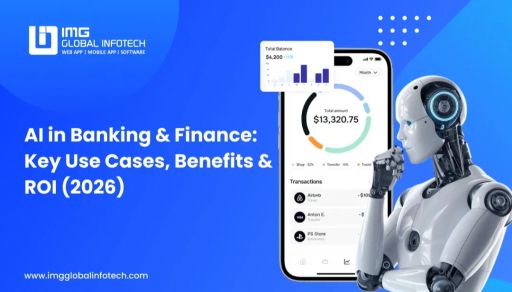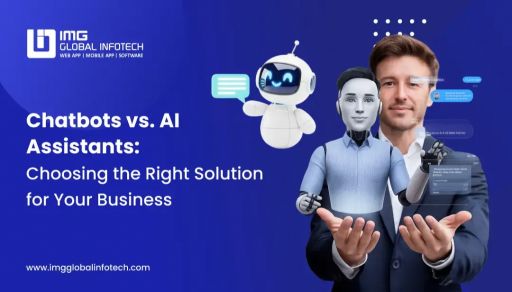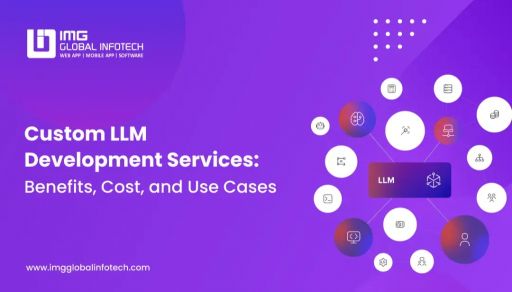The Future Of Logistics: How AI Is Shaping The Supply Chain
Lokesh Saini
Jun 22, 2025

Artificial Intelligence (AI) is rapidly transforming every major industry and logistics is no exception. Once dependent on manual processes, the logistics and supply chain sector is now embracing AI to automate and optimize operations at scale.
According to recent reports from Statista, logistics companies lose countless hours due to manual tasks such as paperwork, inventory handling, order management, and route planning. With the integration of AI, these time-consuming operations can now be executed faster, smarter, and more efficiently.
From tweaking purchase orders to processing documentation and responding to supplier queries, AI is helping logistics businesses free up valuable resources and reduce operational costs. This shift is not just about automation—it's about smarter decision-making, real-time visibility, and future-ready supply chain management.
And that’s why a growing number of logistics businesses are adopting AI-powered solutions to streamline workflows, boost productivity, and gain a competitive edge in an increasingly demanding market.
Real-World Examples of AI in Logistics
Artificial Intelligence (AI) is playing a pivotal role in modernizing logistics and supply chain management. As global delivery demands grow, AI is enabling logistics companies to operate faster, smarter, and more profitably. From smart warehousing to automated customer service, AI’s footprint is visible in nearly every logistics operation today.
1. Logistics Planning
AI-Driven Demand Forecasting
AI models use real-time and historical data to predict future customer demand with high accuracy. Unlike traditional methods, AI forecasting adapts quickly to changes in buying behavior, promotions, and seasonal spikes.
Key Benefits:
-
Reduces stockouts and overstock
-
Optimizes warehouse space
-
Improves vehicle dispatch planning
Dynamic Supply Planning
AI dynamically adjusts supply chain parameters based on demand signals, shipping delays, supplier updates, and inventory levels minimizing resource waste and optimizing replenishment.
Use Case: AI systems re-route inventory or suggest vendor shifts in real-time to maintain flow and profitability.
2. Automated Warehousing
Smart Robotics in Warehouses
Autonomous mobile robots (AMRs) now pick, sort, and transport goods within smart warehouses—enhancing accuracy and reducing processing time by up to 70%.
Example: Amazon’s fulfillment centers operate with more than 200,000 AI-powered robots.
Computer Vision for Damage Detection
AI-powered vision systems scan packages for dents, leaks, or label mismatches, flagging any issues instantly before shipping ensuring better product quality.
Benefits:
-
Improves customer satisfaction
-
Cuts return costs
-
Enhances safety compliance
Predictive Maintenance for Equipment
By analyzing real-time data from IoT sensors, AI can detect anomalies in warehouse machinery preventing unexpected breakdowns and costly downtime.
3. Autonomous Things
Self-Driving Trucks & Vans
AI-enabled autonomous vehicles are reshaping long-haul logistics by offering 24/7 driving, lower fuel consumption, and fewer accidents due to fatigue.
Example: Companies like Tesla, Einride, and Volvo are testing fully autonomous logistics fleets.
Delivery Drones
AI-controlled drones provide a fast and efficient solution for last-mile delivery—especially in congested cities or remote regions.
Industries: E-commerce, emergency healthcare, and rural logistics benefit most.
4. AI-Driven Analytics
Real-Time Route Optimization
AI combines GPS, traffic data, delivery time windows, and weather to instantly compute the fastest, cheapest, and safest delivery routes.
Impact: Companies like UPS save millions annually using route optimization tools like ORION.
Dynamic Pricing Algorithms
AI adjusts logistics pricing dynamically based on market demand, fuel prices, competitor rates, and package volume.
Use Case: Freight companies use AI to bid on shipments in real-time with optimal margins.
5. Back-Office Automation
AI for Document Processing
AI tools extract structured data from shipping forms, invoices, and customs documents automatically inputting them into logistics management systems.
Benefits:
-
Reduces human error
-
Speeds up clearance and billing
-
Improves compliance reporting
Intelligent Workflow Automation
AI combined with RPA (Robotic Process Automation) automates repetitive back-office tasks like shipment tracking, scheduling, invoice generation, and reporting.
AI-Powered Customer Support
Chatbots answer common questions like delivery status, delay causes, return requests, and shipping cost queries—24/7 and at scale.
Impact: Reduces ticket volume by 60% and boosts user satisfaction.
6. Sales & Marketing Enhancement
AI-Based Lead Scoring
AI helps logistics providers prioritize high-intent B2B prospects by scoring leads based on website behavior, email interaction, and social signals.
Personalized Marketing Automation
From tailored emails to custom offers, AI segments audiences and triggers campaigns automatically based on real-time logistics service usage.
Predictive Sales Insights
AI dashboards provide forecasts for logistics demand trends, potential client churn, or upsell opportunities—helping sales teams make proactive decisions.
Impact of AI on the Logistics Industry
The logistics industry, traditionally dependent on manual processes, has long struggled with inefficiencies and delays. From warehouse operations to transportation and delivery, every step required human intervention, resulting in time-consuming and error-prone workflows. However, the integration of Artificial Intelligence (AI) is transforming this landscape dramatically.
Below is a comparison of how logistics functioned before AI versus how it operates today with AI-driven innovations.
Logistics Without AI: The Challenges
1. Manual Operations and Human Errors
Before AI, most logistics operations such as picking, packing, sorting, and shipping were managed manually. These traditional methods consumed excessive time and often led to errors in inventory handling and order processing. According to industry estimates, warehouses wasted more than 3,000 hours annually due to outdated manual workflows.
2. Static Route Planning
Logistics managers relied on pre-planned, static routes that couldn’t adapt to real-time conditions. Factors like sudden weather changes, road closures, or traffic congestion often led to delivery delays and increased fuel consumption. The lack of real-time insights made it impossible to optimize delivery routes on the fly.
3. Lack of End-to-End Visibility
A significant portion of supply chain executives admitted to lacking complete visibility into their logistics operations. Without AI, real-time monitoring and proactive disruption management were nearly impossible, leaving businesses vulnerable to unforeseen delays and inefficiencies.
4. Delayed Decision-Making
Without intelligent data analytics, logistics businesses struggled to make quick, informed decisions. Manual data collection and reporting slowed down processes, resulting in missed opportunities and operational bottlenecks.
Logistics With AI: The Transformation
With the integration of AI technologies, the logistics industry has undergone a significant shift toward smarter, data-driven operations. AI now plays a pivotal role in addressing traditional challenges and driving measurable business outcomes
.
1. Cost Reduction and Operational Efficiency
AI-driven warehouse automation has proven to reduce operational costs by up to 50%. Tasks like order picking, inventory tracking, and quality checks are now handled by AI-powered systems and robots, ensuring faster and more accurate execution.
2. Intelligent Route Optimization
AI enables real-time route planning based on traffic, weather, and delivery urgency. This not only helps reduce fuel consumption but also minimizes delivery times and enhances overall supply chain performance.
3. Predictive Analytics for Disruption Management
AI tools analyze historical data and current trends to forecast potential disruptions such as equipment failures, shipment delays, or stock shortages. This predictive capability allows businesses to plan proactively, ensuring smooth and continuous operations.
4. Enhanced Supply Chain Visibility
By integrating AI with IoT devices and sensors, logistics companies gain real-time visibility across the entire supply chain. This ensures better coordination, improved accuracy, and faster response times to emerging issues, especially when paired with GS1 QR code standards that enhance traceability and data consistency.
5. Automation of Complex Tasks
AI automates complex and repetitive tasks such as processing orders, managing shipments, updating inventory, and responding to customer queries. This leads to greater accuracy and allows human workers to focus on more strategic responsibilities.
The Future Outlook
According to Market.US, by the end of 2024, over 65% of AI tools in logistics will be integrated with IoT devices, enabling smarter and more connected supply chain networks. Furthermore, nearly 50% of logistics companies are expected to adopt autonomous robots in their warehouse operations.
Industry experts predict that AI will increase overall logistics productivity by more than 40% by 2035. This growth highlights AI's potential to solve long-standing problems and set new benchmarks in efficiency, accuracy, and scalability.
Choose IMG Global Infotech for AI Integration Services in Logistics
As the logistics and supply chain industry undergoes digital transformation, businesses need intelligent, future-ready solutions to remain competitive. IMG Global Infotech specializes in providing custom AI integration services for logistics companies, helping you streamline operations, reduce costs, and enhance real-time visibility across the supply chain.
With our deep expertise in AI, machine learning, predictive analytics, and logistics automation, we design and deploy scalable AI solutions that align with your operational goals. Whether you're looking to automate your warehouse, optimize delivery routes, or implement smart fleet management, IMG Global Infotech is your trusted technology partner.
Why Partner with IMG Global Infotech?
-
Proven experience in AI-driven logistics software development
-
Tailored solutions for warehouse automation, route planning, and fleet optimization
-
Seamless integration with IoT devices, ERP systems, and cloud platforms
-
Trusted by global logistics firms, 3PL providers, and eCommerce businesses
Conclusion
AI has already proven its value in transforming how logistics businesses operate by optimizing delivery routes, improving inventory management, and providing real-time visibility into supply chain activities. Companies that embrace AI in logistics and supply chain management today are setting the foundation for long-term growth, resilience, and customer satisfaction.
Lokesh Kumar is the Digital Marketing Manager & SEO Content Strategist at IMG Global Infotech, a top-rated Web & Mobile App Development Company. With extensive experience in digital marketing, SEO, and content strategy, he specializes in boosting online visibility and driving organic growth for startups, SMEs, and global brands. Lokesh is passionate about creating SEO-friendly, user-centric content that not only ranks but also converts. His deep understanding of digital trends and search algorithms helps businesses thrive in a competitive online space.












